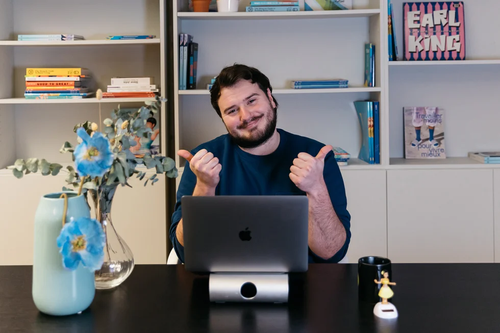Work psychology: Don’t be afraid to voice your doubts at work
Jun 29, 2022
3 mins


Why do we procrastinate at work when we’re struggling to cope? Why do we imagine the worst when it comes to our jobs? Why do we work five days a week rather than three, four, or six? And who thought weekends were a good idea? Discover Work Psychology, the series that offers you the chance to kick back and ponder existential questions from the world of work while getting one step ahead of your brain with our lab expert Albert Moukheiber.
Expressing doubt is often seen as a negative: we don’t want to show any uncertainty or that we don’t believe in ourselves completely. It’s as if we need perpetual reassurance. But is this really a good thing? Isn’t it important to doubt ourselves, at least a bit, in life in general but also at work?
Learn to express your doubts without fear
When we talk about making way for doubts, we’re not talking about a lack of self-confidence. To the contrary, expressing doubt requires a good level of self-confidence: knowing that I’m a competent employee, I’m able to admit when I’m wrong or feel doubtful.
And having some self-doubt is crucial, especially in the working world. Let’s say I’m a manager with a lot of responsibility, but I never express any doubts. The inevitable result is that my colleagues won’t be able to voice concerns or to contradict me. One example is the former company BlackBerry. This once-undisputed market leader hired managers who believed that smartphones were merely gadgets for teenagers, while BlackBerry users were serious consumers who needed a physical keyboard to write and send emails. In other words, there was no doubt: completely convinced by their own argument, managers and employees at BlackBerry neglected to develop an AppStore or to create a touch phone. And… well, we all know how that went.
Space for self-doubt and for others
Self-doubt demonstrates “mental flexibility”: It allows time to reflect, which means re-examining any assumptions, rather than simply confirming them. So when do I need to think differently? When should I question my beliefs? Well, whenever you have an unwavering position regarding a statement, opinion, or situation — watch out. That’s a red flag. If you believe something has no chance of happening or of ever coming true, be careful. You might be committing the sin of being over-confident.
But how do you go about this?
There are several ways, but the simplest and most practical is called “informational conformity.” With this method, you place trust in others rather than in yourself alone. In a nutshell, I align myself with others because they may have more accurate information than I do.
I surround myself with people who become my safeguards, and I become theirs. For example, I aim to be a guru in my areas of expertise – neuroscience, psychology, and cognitive sciences – but I let others guide me in regard to subjects I haven’t mastered, such as entrepreneurship, finance, and economics.
In the same vein, it’s okay to at times let others decide for you. One misconception in relation to critical thinking is the idea that you need to “think for yourself” all of the time. In fact, It’s unrealistic to think for yourself concerning everything, especially at work, so we need to collaborate. Because what is “work” in the end? It’s sharing a common goal – and we’re all employees moving toward this goal. I need to be able to doubt myself and to let others do the thinking and decision-making when it’s appropriate. My reasoning, emotions, and intuition should also be shaped by others – and I hope and expect to do the same for them when my expertise is needed.
In this collective decision-making process, we become each others checks and balances — and that’s when expressing doubt and questioning accepted ideas becomes a much more positive experience. So the next time you have a stroke of genius, question it – at least a bit. Maybe your idea lacks something, but maybe with the power of collaboration, you and your coworkers can make it truly brilliant.
Translated by Lorraine Posthuma
Photo: Welcome to the Jungle
Follow Welcome to the Jungle on Facebook on LinkedIn and on Instagram and subscribe to our newsletter to get our latest articles every day!

More inspiration: Albert Moukheiber
Doctor in neuroscience, clinical psychologist and author

Work Psychology : The fallacies of binary thinking
Can humans be creative and analytical at the same time?
Dec 19, 2022

What if our search for meaning at work is meaningless?
Welcome to the Jungle's psychology of work expert asks if corporate promises of meaning are merely pseudo-deep bullshit...
Oct 24, 2022

Learned helplessness: When a will doesn't provide a way
In the 1960s, two American psychologists figured out why willpower isn't always enough to turn our lives around
Oct 20, 2022

‘Six months of working followed by two weeks’ holidays! That’s ridiculous.’
What if our balance has been wrong from the start? We spoke to Albert Moukheiber — doctor in neuroscience and clinical psychologist.
Oct 14, 2021

Psyched: is the quest for success making you unhappy?
Is professional success the sole reason for your life's satisfaction? Dr Albert Moukeiber explains why this could be harmful to your mental health.
Jul 22, 2021
The newsletter that does the job
Want to keep up with the latest articles? Twice a week you can receive stories, jobs, and tips in your inbox.

Looking for your next job?
Over 200,000 people have found a job with Welcome to the Jungle.
Explore jobs